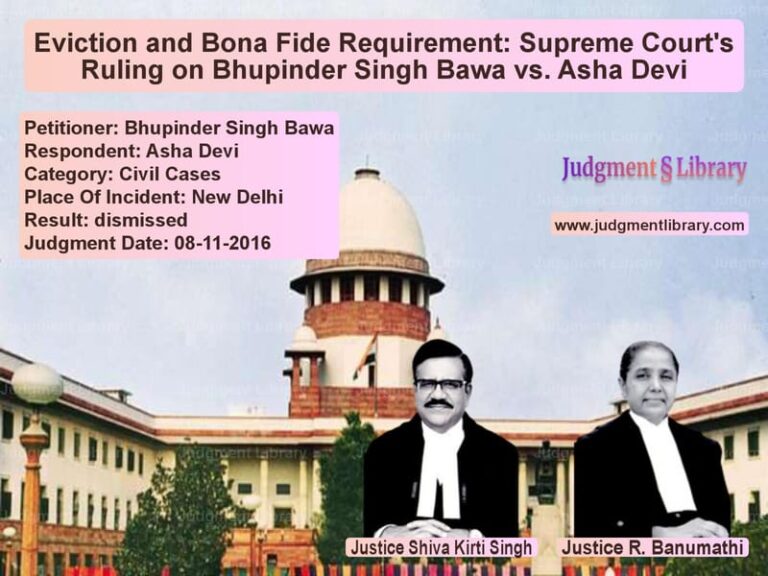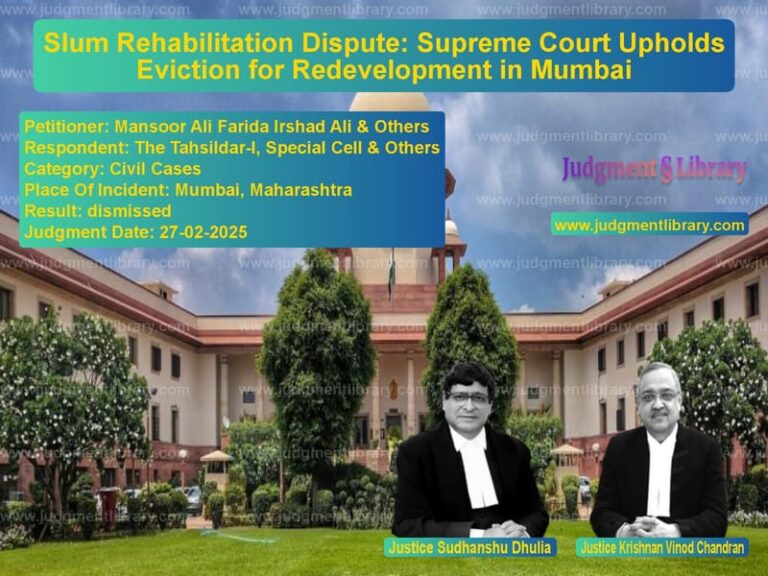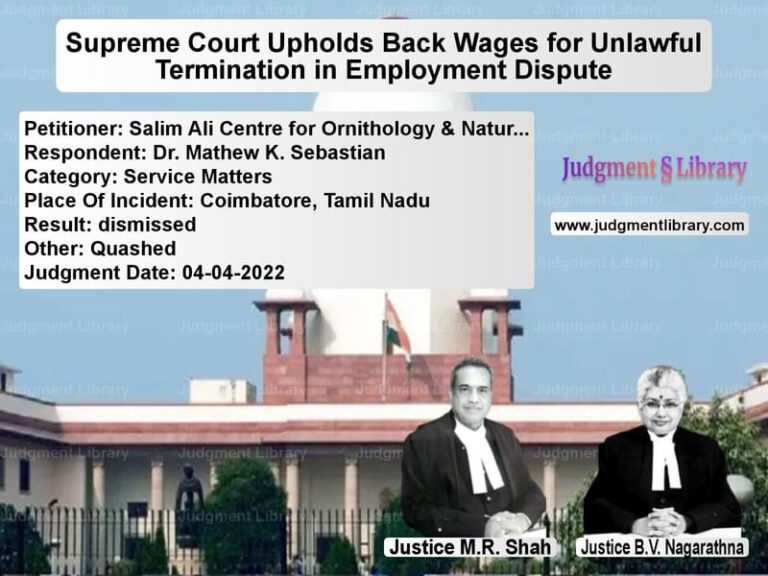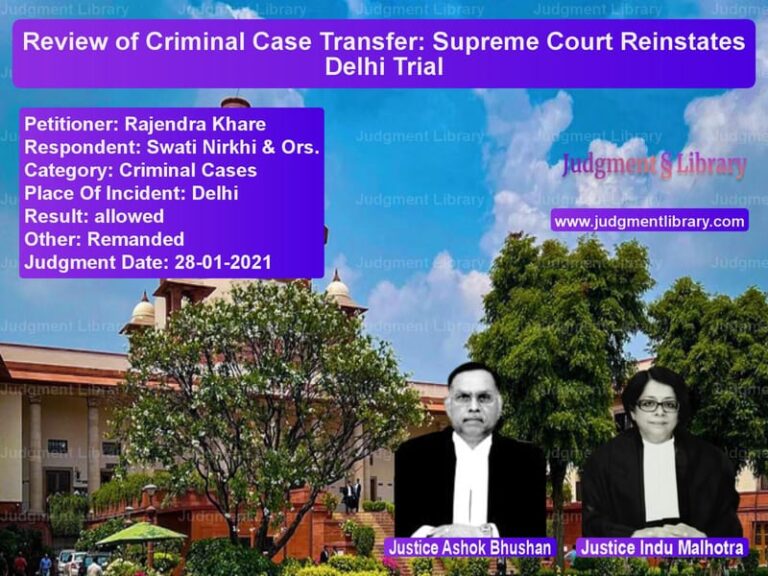Supreme Court Upholds Sale of Residential Plot: Dismisses Housing Society’s Claim of False Affidavit
The Supreme Court of India has ruled in favor of Sri Shobhan Pal Singh & Anr., dismissing the appeal filed by Purushottam Bagh Sahkari Awas Samiti Ltd., which had sought the cancellation of a residential plot sale on the grounds of an allegedly false affidavit. The ruling reinforces the principle that cooperative societies must provide clear evidence before invalidating past transactions.
Background of the Case
The case pertains to a residential society named Purushottam Bagh Sahkari Awas Samiti Ltd. in Agra, formed under the U.P. Cooperative Societies Act, 1965. The dispute arose over a 933 sq. meter plot (B-1) that had been allotted to Krishna Pal Singh, the predecessor of the respondents, through a sale deed executed on July 14, 1983.
The society later alleged that Krishna Pal Singh had obtained the plot through a false affidavit, claiming he did not own any other residential property within the society’s operational area. Based on this claim, the society referred the matter to arbitration in 2010, nearly 26 years after the sale, seeking to nullify the transaction.
Key Facts of the Case
- In 1983, Krishna Pal Singh was allotted the residential plot based on his affidavit stating he did not own any other residential property in the society’s operational area.
- In 1992, he passed away, and the property was transferred to his legal heirs, Shobhan Pal Singh and Lt. Col. Upendra Pal Singh, through a mutation process recognized by the society.
- In 2010, the society alleged that Krishna Pal Singh had misrepresented facts at the time of allotment and initiated arbitration proceedings to reclaim the plot.
- The arbitrator ruled in favor of the society in 2010, declaring the 1983 sale deed null and void, which was upheld in appeal by the cooperative tribunal in 2011.
- The respondents challenged the decision in the Allahabad High Court, which set aside the arbitration ruling, stating that the society had failed to provide documentary proof of fraud.
- The society then appealed before the Supreme Court.
Arguments by the Appellant (Purushottam Bagh Sahkari Awas Samiti Ltd.)
The housing society, represented by Senior Counsel D.S. Naidu, argued:
- Krishna Pal Singh provided a false affidavit in 1983, concealing that he owned residential property in the society’s operational area.
- The bye-laws of the society prohibit the allotment of a residential plot to anyone who, or whose family members, already own property in the area.
- The plot was purchased for investment purposes and remained undeveloped for years.
- The arbitration ruling was justified as it upheld the cooperative society’s right to protect its regulations and prevent unauthorized acquisitions.
Arguments by the Respondents (Legal Heirs of Krishna Pal Singh)
The respondents, represented by their legal counsel, countered:
- The housing society failed to provide any evidence proving that Krishna Pal Singh or his family owned another house in the area at the time of allotment.
- The arbitrator exceeded his jurisdiction, as disputes related to ownership and fraud do not fall under the cooperative society’s arbitration mechanism.
- The delay of 26 years in challenging the transaction was unreasonable and indicated that the society acted in bad faith.
- The society itself had acknowledged the transfer of ownership to the legal heirs, which undermined its argument that the initial allotment was fraudulent.
Supreme Court’s Observations
A bench comprising Justices Abhay S. Oka and Pankaj Mithal examined the case and found in favor of the respondents. The key findings included:
1. No Proof of False Affidavit
The Court noted that the society had not presented any documentary proof to establish that Krishna Pal Singh owned another house in the society’s operational area:
“The society has failed to furnish any documentary proof before the arbitrator regarding the allegation that the petitioners or their predecessor owned another property in Agra.”
2. Arbitrator’s Lack of Jurisdiction
The Court ruled that disputes concerning the validity of sale deeds fall outside the scope of cooperative arbitration mechanisms:
“The arbitrator did not have jurisdiction to declare the sale deed null and void. Such matters should have been addressed through civil litigation.”
3. Unjustified Delay in Challenging the Sale
The Court expressed concerns over the 26-year delay in raising objections:
“It is incomprehensible why the society remained silent for over two decades before raising allegations of misrepresentation.”
4. No Legal Grounds for Sale Deed Cancellation
The Court emphasized that property rights cannot be annulled based on mere allegations:
“A valid sale deed executed in 1983 cannot be declared void merely because a cooperative society later suspects misrepresentation without any supporting evidence.”
Final Verdict
The Supreme Court ruled:
- The appeal filed by the housing society was dismissed.
- The Allahabad High Court’s decision was upheld.
- The sale deed dated July 14, 1983, in favor of Krishna Pal Singh remains valid.
- No costs were imposed on either party.
Implications of the Judgment
The ruling has significant implications for property law and cooperative housing societies:
- Protects Property Rights: Reinforces that long-standing sale deeds cannot be arbitrarily invalidated.
- Limits Cooperative Societies’ Powers: Societies cannot unilaterally cancel transactions without clear evidence.
- Clarifies Arbitration Scope: Cooperative societies cannot resolve land ownership disputes through internal arbitration.
- Discourages Delayed Litigation: Courts will not entertain cases where allegations are raised decades after the transaction.
Conclusion
The Supreme Court’s ruling in Purushottam Bagh Sahkari Awas Samiti Ltd. vs. Sri Shobhan Pal Singh & Anr. ensures that cooperative housing societies cannot arbitrarily cancel past transactions without clear evidence. This decision upholds the sanctity of property rights while reinforcing that disputes over sale deeds must be resolved through proper legal channels, not internal arbitration.
Petitioner Name: Purushottam Bagh Sahkari Awas Samiti Ltd..Respondent Name: Sri Shobhan Pal Singh & Anr..Judgment By: Justice Abhay S. Oka, Justice Pankaj Mithal.Place Of Incident: Agra, Uttar Pradesh.Judgment Date: 04-09-2023.
Don’t miss out on the full details! Download the complete judgment in PDF format below and gain valuable insights instantly!
Download Judgment: purushottam-bagh-sah-vs-sri-shobhan-pal-sing-supreme-court-of-india-judgment-dated-04-09-2023.pdf
Directly Download Judgment: Directly download this Judgment
See all petitions in Property Disputes
See all petitions in Contract Disputes
See all petitions in Landlord-Tenant Disputes
See all petitions in Judgment by Abhay S. Oka
See all petitions in Judgment by Pankaj Mithal
See all petitions in dismissed
See all petitions in Quashed
See all petitions in supreme court of India judgments September 2023
See all petitions in 2023 judgments
See all posts in Civil Cases Category
See all allowed petitions in Civil Cases Category
See all Dismissed petitions in Civil Cases Category
See all partially allowed petitions in Civil Cases Category







